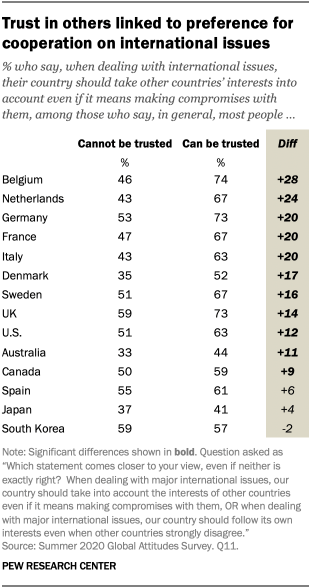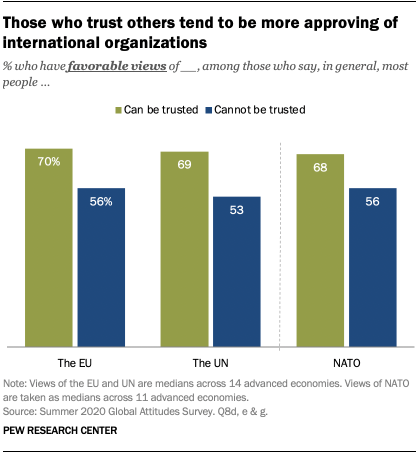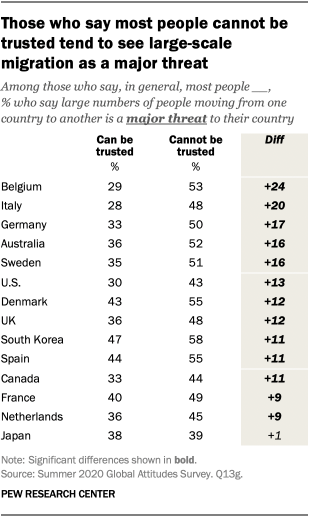People around the world broadly support the principles of international cooperation amid common challenges such as climate change and the coronavirus outbreak, according to a summer 2020 Pew Research Center survey of 14 advanced economies. But support for international cooperation – as well as for key international institutions – can vary significantly depending on the amount of trust that people tend to place in others.
Across the countries surveyed, those who say that, in general, most people can be trusted express more support for compromising with other countries and express a higher degree of favorability toward international institutions including the European Union and the United Nations.
This analysis focuses on cross-national views of international cooperation, international organizations and mass migration in 14 advanced economies and how these views relate to the level of trust people have in others. Pew Research Center has published previous analyses of attitudes toward international cooperation, institutions and threats, both globally and in the U.S.
For this report, we use data from nationally representative surveys of 14,276 adults from June 10 to Aug. 3, 2020, in 14 economically advanced countries. All surveys were conducted over the phone with adults in the United States, Canada, Belgium, Denmark, France, Germany, Italy, the Netherlands, Spain, Sweden, the United Kingdom, Australia, Japan and South Korea.
Due to the coronavirus outbreak, face-to-face interviewing is not currently possible in many parts of the world, so surveys were only conducted in countries with robust telephone polling operations.
Here are the questions on views of international cooperation, views of the EU, views of NATO and views of mass migration used for this analysis, along with responses, and its methodology. Previously released results on people’s relative trust in others can be found here.
In 11 of the 14 countries surveyed, those who say most people can be trusted are significantly more likely to believe their country should take the interests of other nations into account when dealing with major international issues, even if it means making compromises with them, as opposed to following its own interests.
The gap between “trusters” and “distrusters” is most pronounced in Belgium, the site of the headquarters of NATO, the European Commission and the Council of Ministers. About three-quarters of trusters in Belgium (74%) say their country should take other countries’ interests into account, compared with just 46% of distrusters. Differences of 20 percentage points or more also emerge in other Western European nations, including the Netherlands, Germany, France and Italy.
Divides between trusters and distrusters also appear when people are asked about several international institutions. In all 14 countries surveyed, trusters are more likely than distrusters to have a favorable view of the EU and UN.
Differences in views of the EU appear even in nonmember countries. In Japan, for example, 54% of trusters have a favorable view of the EU, compared with 35% of distrusters. And when it comes to the UN, gaps between trusters and distrusters are sometimes stark: In Germany, for instance, seven-in-ten trusters have positive views of the organization, compared with about half of distrusters (48%).
Views of the North Atlantic Treaty Organization also divide along these lines in most of the surveyed countries. The gap is largest in Denmark, where roughly eight-in-ten trusters (83%) have a favorable opinion of NATO, versus nearly six-in-ten distrusters (59%).
In some countries, trusters are also more likely than distrusters to give the World Health Organization (WHO) positive marks on its initial response to the coronavirus pandemic. Such differences exist in countries including Denmark, France, the Netherlands, Germany, Sweden and Australia. Only in South Korea are distrusters significantly more positive on the WHO’s coronavirus response: 22% of South Korean distrusters said the WHO had done a good job, compared with just 16% of trusters.
Trust and migration
When it comes to identifying major international threats to their country, trusters and distrusters are strongly divided on at least one issue: migration.
In every country surveyed but Japan, distrusters are significantly more likely to say that large numbers of people moving from one country to another is a major threat to their own nation. A median of 50% of distrusters across the 14 countries say such migration is a major threat, compared with a median of just 36% of trusters.
The gap between trusters and distrusters on the threat of migration is largest in Belgium, where 53% of distrusters – but only 29% of trusters – say it is a major threat.
Those who say most people cannot be trusted are more likely to have favorable views of right-wing populist parties in Europe, many of which advocate for hard-line anti-immigration policies.






